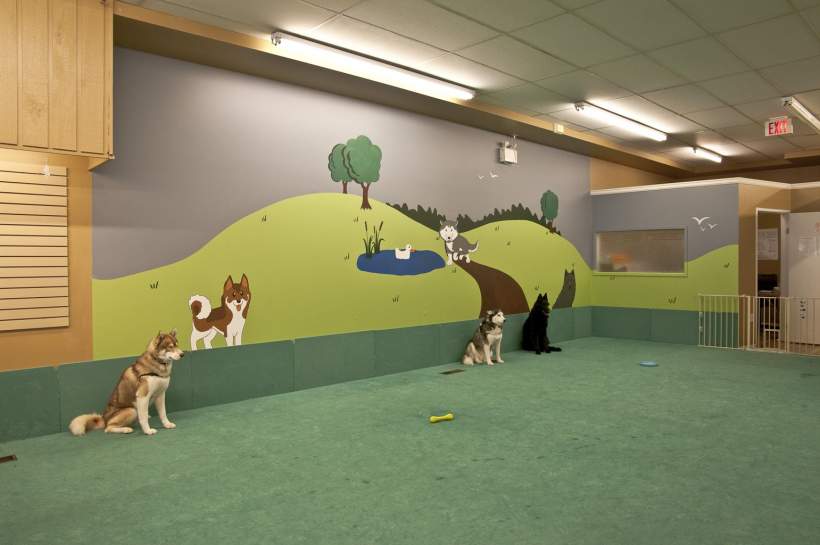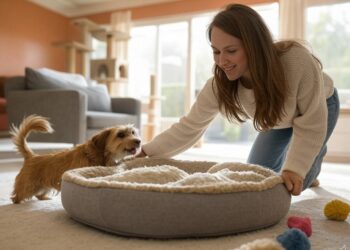Your dog’s first day at doggy daycare opens up a world of excitement. And for you, you’ll know your dog has somewhere they love visiting while you’re off at work or busy. It’s an ideal situation for everyone.
But just like dropping off kids on their first day of school, there are some tips and tricks you can use to make the process even smoother. Dogs, like kids, can sense nervousness or unease, making it crucial to have your mind at ease before the preparations begin.
These tips help ensure a seamless introduction to doggy daycare. Keep a few points in mind as you prepare: think about safety, health, and any dietary or behavioral requirements your dog may have. Let’s begin!
Make Sure You Have Records Of Vaccinations
Getting your dog vaccinated is the first step in this process if they aren’t already. Most doggy daycares will require proof of vaccinations, which veterinarians provide. If they don’t ask, take this as a bad sign and walk the other way. Vaccinations are especially important at doggy daycares, as dozens of dogs are mingling and potentially passing sicknesses. Kennel cough is one of the vaccinations doggy daycares typically request.
Your daycare of choice will likely ask you and your dog to come in for an assessment. Have your vaccination records ready then, and let them know of any health concerns your dog needs to be accommodated. Again, if the daycare isn’t asking to see your dog’s health history or requesting an assessment of any kind, it’s best to take your business elsewhere.
Check What’s Included In Your Daycare’s Service
It’s a good idea to check the list of services your daycare provides. You’ll want to know what is included in the standard rate and what may add an extra charge, like walks or extra time playing and socializing. You may also want to opt-in for a few extra services like dog grooming or dog training classes.
Though many daycares are accommodating to your desires, there are services that they must charge a little more for. Standard service charges include feedings, playtime, and the general safety and supervision of your dog. You can also check on their full-day and half-day services, and all the bonuses that you could give your dog for an extra lavish experience!
Treat For Fleas And Ticks
Doggy daycares usually require some form of flea and tick treatment as well as vaccinations. This is for your dog’s own safety, as they’re touching and mingling with dogs from a variety of environments. Flea and tick treatments are especially important if your daycare offers large outdoor play areas. Your dog will love this area, but so do other critters.
Flea and tick treatments are easy to come across and apply. You’ll need to keep up with treatments ever so often, but the maintenance is light.
Make Sure Your Dog Is Socialized
Ensuring your dog is properly socialized is for their own benefit and fun. A shy or nervous dog may come to dread or even fear doggy daycare despite the best efforts of staff members. Mitigate this by socializing your dog beforehand. A socialized pup will respond to doggy daycare just as intended–with excitement and joy.
To socialize your dog, you’ll need to do a bit more than introduce them to your friends. Try visiting a dog park, which mimics the environment of doggy daycares. Let your dog interact with other dogs and their owners–big breeds, little breeds, and everyone in between.
Once you notice your dog is enjoying playing with other dogs, you can confidently determine that they’ll enjoy daycare just as much. With that said, some dogs will struggle to become social. If this is the case, doggy daycare alternatives may be the best option for you both.
Have Your Dog Spayed Or Neutered
Preventing an unwanted litter of puppies is an obvious reason why doggy daycares often require this surgery. A slightly less-known benefit is that your dog will show fewer signs of aggression to other dogs. This is true for every dog breed, which is why daycares so often require it. Make sure you’ve taken your dog through the procedure beforehand, with plenty of time allotted for them to heal and recover.
Bring Your Own Food
Be sure to take a baggie of your dog’s food with you on their first day. Doing this will help you avoid any extra charges and upset stomachs from the new food. Staff at the daycare will use your food for your dog only, meaning you won’t have to worry about sudden depletions in your stock.
Bringing your dog’s usual food for them to eat also helps establish an element of familiarity, which is especially beneficial for nervous or shy dogs.
Reading Suggestion: Happy Dog Food Review and Recommendations for 2022
Take A Potty Break Before Drop-Off
Your dog will do better on their first day with an empty bladder, especially if they tend to pee with excitement. Doggy daycare is arguably one of the most thrilling adventures for dogs, so a quick walk beforehand is a good idea. Taking steps to avoid a mess also makes staff members more available for interacting and playing with their new students.
Arrive Early
Arrive at your daycare a bit early, just as you would on a child’s first day of school. Give them some time to get acquainted with the staff and the daycare building–without dozens of dogs vying to greet them. A calm introduction is a great way to set up successful visits down the road.
You’ll also want some time to go over any questions or concerns you may have with the daycare staff, especially if your dog has health or dietary restrictions.
Know That Not Every Dog Is Accepted
As much as you may want them accepted, some dogs are not fit for the doggy daycare environment. They may be too timid or overwhelmed in such a rowdy place, and daycare staff members won’t want your dog feeling so down. In some cases, aggression will keep your dog from being accepted.
Aggression is not tolerated in daycares for the safety of the dogs and staff. If you know your dog has a temper, try taking them to behavioral classes before they are evaluated at the daycare.








